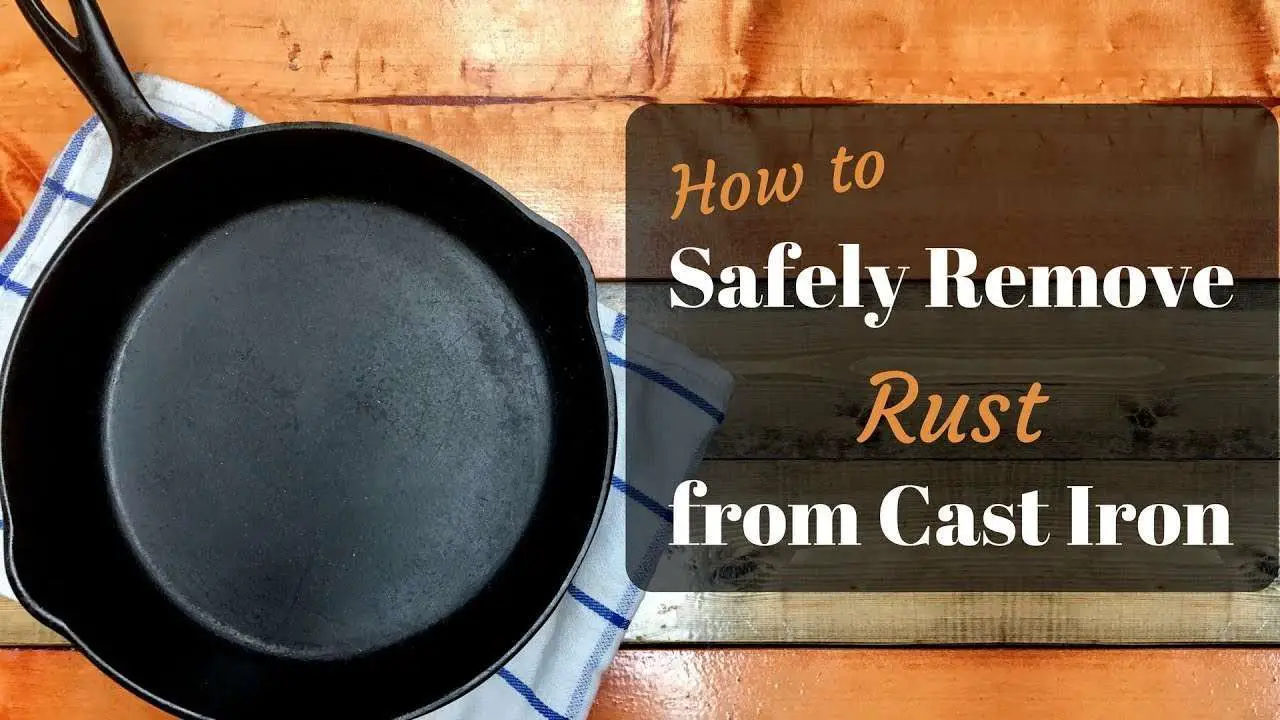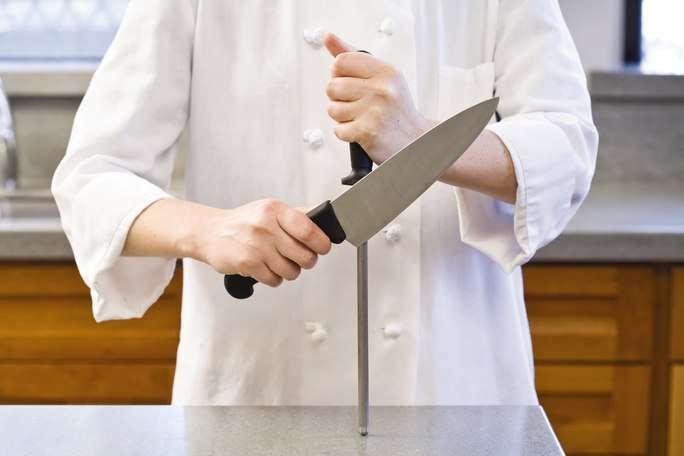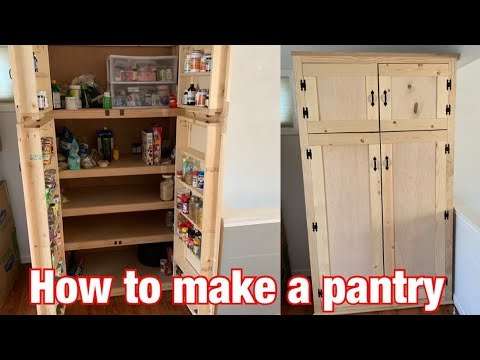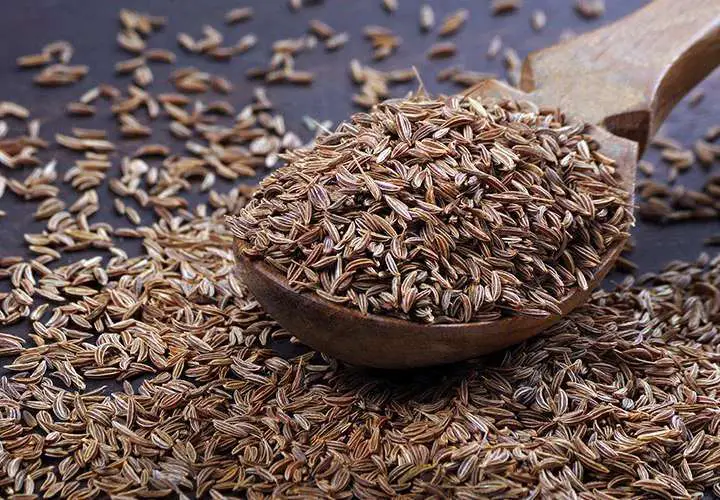Best ways to remove rust from cookware
Best ways to remove rust from cookware, use a mixture of baking soda and water or vinegar with salt. Scrub with a potato dipped in dish soap for stubborn rust.
Dealing with rusty cookware can be frustrating, especially when it’s your favorite pan at stake. Rust occurs when iron reacts with oxygen and water, a common issue in kitchen environments. Finding the best way to tackle this problem is essential to preserving the life of your cookware.
Home remedies have proven to be effective and environmentally friendly options. Reclaiming the shine and functionality of your pots and pans doesn’t have to be a daunting task. Here, we explore the top methods that combine simplicity and efficiency, ensuring your cookware returns to its former glory without harsh chemicals. It’s essential to equip yourself with these easy solutions to maintain your kitchen essentials in optimal condition.
Vinegar Soak: Submerge Cookware In Vinegar.
Discover the effectiveness of a simple vinegar soak to effortlessly banish rust from your cookware. Submerging pots and pans in vinegar can restore their shine and function, ensuring your kitchen essentials remain in peak condition.
Rust on cookware is not just unsightly; it can also compromise the integrity of your cooking surfaces. Before you consider throwing out your rusty pots and pans, give them a new lease on life with a simple vinegar soak. This tried-and-true method is effective and eco-friendly.
Vinegar Soak: Submerge Cookware In Vinegar
Submerging your cookware in vinegar is a gentle yet effective way to tackle rust. Vinegar’s natural acidity breaks down rust, allowing for easier removal without the need for harsh chemicals.
- Prepare the vinegar solution: Fill a container with enough white vinegar to completely submerge the cookware.
- Soak the cookware: Place your rusty items into the vinegar bath, ensuring that they’re fully immersed. Let them sit for a period ranging from one hour to overnight, depending on the extent of the rust.
- Scrub off the rust: After soaking, use a scrubber to remove the loosened rust. You’ll find that it comes off with much less effort than before.
- Rinse thoroughly: Once the rust is removed, wash the cookware with water to ensure all vinegar is washed away.
- Dry completely: To prevent future rusting, dry your cookware immediately with a towel or allow it to air dry in an open space.
The vinegar soak is a prime example of how everyday household items can have multiple, effective uses. By opting for this approach, you’re choosing a method that is safe for both your cookware and the environment.
Baking Soda Paste: Make A Paste With Baking Soda And Water.
Effortlessly tackle stubborn rust on cookware using a simple baking soda paste. Combine water with baking soda to form a powerful, non-toxic cleaning agent that makes your pots and pans shine.
Rusting can transform your prized cookware into a disappointing sight. But don’t despair—salvage your pots and pans with a simple yet effective solution right from your kitchen pantry: baking soda. The process is not arduous, and the results will surprise you.
Make a paste, apply, scrub, and rinse. Let’s embark on this rust-removing journey.
Baking Soda Paste: An Easy Solution
An all-natural and readily available ingredient, baking soda is an excellent choice for tackling rust. It’s gentle on your cookware but tough on corrosion.
- Make the paste: Mix three parts baking soda to one part water:
Crafting this mixture transforms baking soda into an abrasive paste suitable for scrubbing off rust.
- Apply to affected areas: Cover the rusty spots with the paste:
Ensuring thorough coverage allows the alkaline properties of the paste to break down the rust effectively.
- Scrub gently: Use a sponge or brush:
A bit of elbow grease here is essential. Scrubbing in a circular motion loosens the grip of the rust without harming the cookware’s surface.
- Let it sit: Wait for about an hour:
This gives the baking soda paste ample time to act on the rust and makes the scrubbing process more manageable.
- Rinse and dry: Wash off the paste with water:
After removing the paste, make sure to dry your cookware completely to prevent new rust from forming.
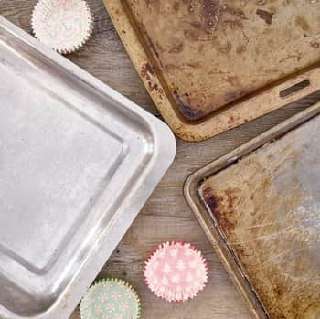
A Step-by-step Guide For Best Results
For optimal rust removal using baking soda paste, follow these steps diligently. Starting with a generous application, ensure the paste is in full contact with the rust. As you scrub, focus on the rusted areas but be gentle to avoid scratches.
After scrubbing, let the cookware rest with the paste on it to allow the baking soda to do its magic. Finally, rinse off the paste to reveal a rust-free surface.
- Use non-metallic tools: Select a brush or sponge that won’t leave additional scratches:
Picking the right tool is crucial for maintaining the integrity of your cookware’s finish.
- Work in a well-ventilated area: Ensuring proper airflow while working with baking soda paste is good practice:
Adequate ventilation keeps the working environment comfortable, especially for lengthier cleaning sessions.
- Repeat if necessary: For stubborn rust, apply a second round of paste:
Some rust spots may be more persistent and require multiple treatments to fully disappear.
- Care for your cookware post-cleaning: Regular maintenance after rust removal extends the life of your cookware:
Keeping your pots and pans dry and seasoning them if they are made of cast iron will prevent future rust formation.
Embrace the simplicity and effectiveness of baking soda and watch as your cookware returns to its former glory. With these rust removal tips, you can ensure your pots and pans are not only functional but also a pleasure to use and display.
Steel Wool Scrubbing: Gently Scrub With Steel Wool.
For stubborn rust on cookware, steel wool proves to be an effective solution. Gently scrub the affected area with the abrasive texture of steel wool to restore your pots and pans to their former glory.
Steel Wool Scrubbing: Gently Scrub With Steel Wool
Rust on cookware isn’t just unsightly; it can compromise the integrity of your pots and pans, making them unfit for cooking your favorite dishes. But before you consider tossing your rusted cookware, give steel wool scrubbing a chance. This simple method can effectively remove rust and restore your items to their former glory.
**Why Steel Wool Works Wonders:**
- Abrasive Action: Steel wool is a highly abrasive material that can scrub away rust without the need for harsh chemicals.
- Flexibility: Its flexible strands can reach into crevices and contours, often found in cookware, ensuring an even clean.
- Economical: Compared to other rust removal methods, using steel wool is cost-effective and doesn’t require any special equipment.
Before you tackle the rust, here’s how to use steel wool for the best results:
- Soaking: Begin by soaking the rusted area with a bit of water or vinegar for a few minutes to soften the rust.
- Scrubbing: Gently scrub the rusted spots with the steel wool, using a circular motion for a more effective clean.
- Rinse and Dry: After scrubbing away the rust, rinse the cookware thoroughly and dry it immediately to prevent new rust from forming.
Remember to wear gloves to protect your hands during the process and to use the steel wool gently to avoid scratching the surface of your cookware. With a bit of elbow grease and patience, your cookware will shine like new.
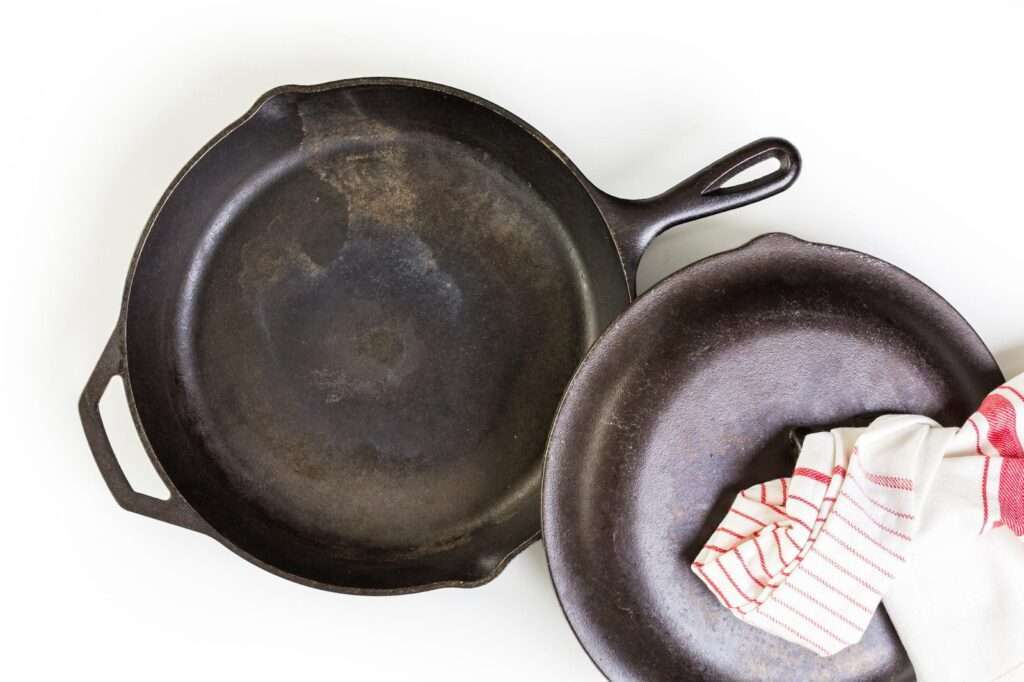
Lemon Juice Treatment: Apply Lemon Juice On Rust Spots.
Harness the natural power of citrus to combat rust on your cookware by applying lemon juice directly to affected areas. This simple, eco-friendly solution effectively breaks down rust, restoring your kitchen essentials to their former glory.
Cookware is like an old friend in the kitchen — reliable until the rust sets in. But there’s no need to toss out your trusty pots and pans when you can revive them. One simple, natural method to combat rust is the lemon juice treatment.
The acidity in lemons works wonders on rust, being both gentle on the cookware and tough on stains.
Lemon Juice Treatment: Apply Lemon Juice On Rust Spots
A touch of lemon juice on rust may not seem like a mighty warrior, but its naturally acidic properties make it an excellent rust remover. It’s particularly useful for treating small spots of rust with a focused approach.
- Gather your supplies: Ensure you have fresh lemons, a bowl, and a soft cloth or a sponge handy.
- Apply directly: Squeeze lemon juice to fully cover the rust spots and let it sit for a couple of hours; the acid does the heavy lifting during this time.
- Scrub gently: Use the soft cloth or sponge to scrub the treated areas. The rust should come off effortlessly, revealing a cleaner surface.
- Rinse and dry: Once you’ve banished the rust, rinse the cookware with water, and thoroughly dry it to prevent further rusting.
Encountering rust on cookware is a culinary hiccup, easily remedied with this straightforward treatment. Embrace the simplicity of this natural solution and celebrate the longevity of your cookware with a zesty twist. Remember, keeping your cookware dry and seasoned, especially if it’s cast iron, is the key to rust-free cooking experiences.
Boiling Method: Boil Cookware In Water With Citric Acid.
Eradicate rust from your cookware effectively by utilizing the boiling method. Simply immerse the items in a solution of water and citric acid to dissolve stubborn oxidation. This technique is a top choice for restoring pots and pans to their former glory.
Best Ways To Remove Rust From Cookware
Isn’t it frustrating when your favorite pan starts to show rust spots? You’re not alone. Rust formation on cookware is a common kitchen nuisance. Fear not—there’s an effective and natural method for regaining that cookware’s former shine. It’s called the boiling method and involves a secret ingredient: citric acid.
Boiling Method: Boil Cookware In Water With Citric Acid
Picture this: your rusted cookware, bubbling away in a pot of water, with the zest of citric acid working magic on the stains. Yes, it’s that straightforward, and here’s how you can do it at home:
- Fill a large pot with water:
Ensure there’s enough water to completely submerge the cookware.
- Add citric acid to the water:
A couple of tablespoons should do, depending on the size of your pot and the extent of rust.
- Submerge the cookware:
Place your rusted items into the acidic bath and prepare to witness some chemistry in action.
- Heat the pot:
Bring the water to a boil and let it simmer. Usually, 10 to 15 minutes should suffice, but heavily rusted items might need a little longer.
- Let it cool and scrub:
Once boiled, safely remove the cookware and let it cool. Then, with a non-abrasive scrubber, gently cleanse the surface. The rust should come off without a fight.
Aftercare For Cookware
Once you’ve bid farewell to the rust, maintaining your cookware’s condition is a breeze. Here’s what you need to do to keep your pots and pans spotless:
- Dry thoroughly:
After washing, grab a towel and dry your cookware immediately. Water is rust’s best friend, so don’t give them a chance to mingle.
- Oil up the surface:
Especially for cast iron, a light coat of oil can shield the metal from moisture and prevent rust from staging a comeback.
- Store properly:
Keep your cookware in a dry environment. If stacking is necessary, place a paper towel in between items to ward off scratches and moisture.
By following these simple but effective steps, you’ll extend the life span of your cookware and sidestep future rust frustrations.
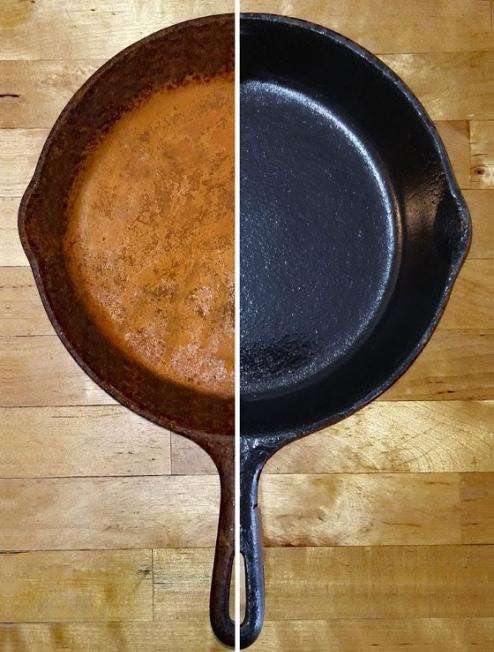
Frequently Asked Questions On Best Ways To Remove Rust From Cookware
What Are Natural Remedies For Rust Removal?
Natural remedies for rust removal include using a mixture of baking soda and water to create a paste. Apply it to the rusty area, let it sit, then scrub off with a brush. Vinegar or lemon juice with salt can also be effective, providing acidity that helps dissolve rust.
Can Vinegar Remove Rust From Cookware?
Yes, vinegar can remove rust from cookware effectively. Soak the affected cookware in white vinegar for a few hours, then scrub gently with a non-metallic brush. Rinse thoroughly with water to clear away any vinegar residue, and dry immediately to prevent further rusting.
How To Prevent Rust On Cookware After Cleaning?
To prevent rust on cookware after cleaning, dry it immediately and thoroughly. Apply a light layer of cooking oil to coat the surface, which creates a protective barrier against moisture. Store in a dry place and avoid leaving cookware wet after use.
Is Rust On Cookware Harmful To Health?
Consuming rust in small amounts from cookware is not typically harmful to health, but it can affect the taste and appearance of your food. However, ingesting significant amounts of rust may pose health risks. It’s best to remove rust from cookware to ensure safety and food quality.
Conclusion
As we wrap up our discussion on rust removal, one thing is clear: maintaining your cookware can be simple and eco-friendly. Utilize these methods to bring back the shine to your pots and pans. Frequent upkeep not only preserves their functionality but also extends their lifespan.
Begin now to ensure your cookware remains in peak condition for all your culinary adventures.


